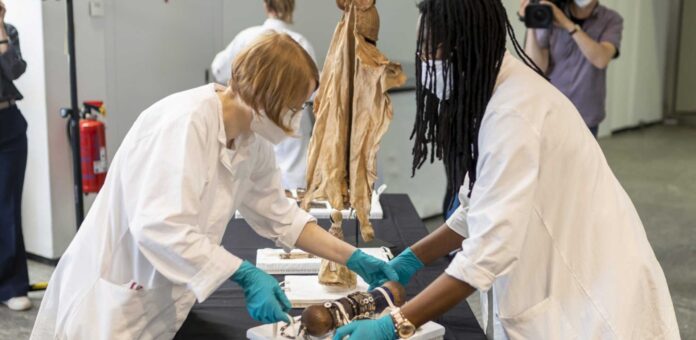After months of negotiations, the federal body that operates the Humboldt Forum in Berlin, the Prussian Cultural Heritage Foundation (SPK), has announced that 23 objects housed at the Berlin Ethnological Museum will finally be returned to Namibia. “We know how significant these objects are for Namibia,” says the SPK president Hermann Parzinger. Jewellery, tools and fashion items from are among the pieces due to be repatriated; the Ethnological Museum is housed at the Humboldt Forum.
“If we now return these objects permanently, we will support our Namibian partners in reconstructing the history of their country,” Parzinger adds. Intense talks with Cameroonian authorities over the past year, also resulted in an agreement to return a female figurine taken from northwestern Cameroon in 1903 by Curt von Pavel, a colonial officer who gave it to the Berlin Ethnological Museum that same year. SPK officials also say they have entered into negotiations with Tanzania regarding the possible return of artefacts.
Germany’s minister for culture, Claudia Roth, has spoken of the need to “think on all levels about how we can decolonise our thinking,” and to “discuss how we can reform the Humboldt Forum”. Top of that list was the possible repatriation of more than 400 Benin bronzes from the Humboldt Forum that had originally been looted by British forces in 1897 after their violent takeover of Benin City in the former Kingdom of Benin, now Nigeria. Last year, the board of the Prussian Cultural Heritage Foundation approved the return to Nigeria of artefacts looted by British troops; none have so far been returned.
However, the German government announced that on 1 July the Foreign Minister Annalena Baerbock and Roth will sign a memorandum of understanding with their Nigerian counterparts, Zubairu Dada and Lai Mohammed, which “paves the way for the transfer of ownership of the Benin bronzes”.

Relief plaque depicting a king (oba) and four attendants (16th century), one of the Benin artefacts held in Berlin’s Ethnological Musuem Photo: © Staatliche Museen zu Berlin, Ethnologisches Museum / Claudia Obrocki
Meanwhile, the Humboldt Forum’s East Wing opens on 16 September. Two rooms of the new wing will be dedicated to a special exhibition on the historic Kingdom of Benin which will include a number of Benin Bronzes (the exact number is currently being negotiated). Even though the bronzes remain in Berlin, the museum labels will reflect the change of ownership and indicate the fact that they are temporary loans from Nigeria.
The new East Wing will also include a selection of artefacts obtained by the ethnographer Johan Adrian Jacobsen who was commissioned in 1881 by then Ethnologogical Museum of Berlin to gather ethnographic objects and other specimens on a trip to North America and Canada. Although, many of the objects Jacobsen obtained on his expedition were purchased directly from indigenous people, a number of artefacts, as his own travelogue revealed, were removed from indigenous grave sites.
Before the Humboldt launch, the organisers of the 12th Berlin Biennale will host From Restitution to Repair, a conference focusing on how to decolonise arts and culture and explore the psychological dimensions of the loss of cultural heritage. The biennale conference (10-11 September) will mainly focus on the African continent and question why the vast majority of precolonial African cultural heritage is still being held in European museums.
Chaired by the biennale’s curator, artist Kader Attia, the conference is likely to further inflame controversy around the museum and the problematic topic of restitution. For Attia, the Humboldt Forum incarnates the complexity of the debate on restitution. Speaking recently in an interview with the Exberliner Magazine, he said: “So Germany has the right to return to what it had [by rebuilding its historic palaces] but the others [other nations] have not got the right to get back their own heritage? That illustrates very much who has the power and how much the power to make decisions is unbalanced.”

























